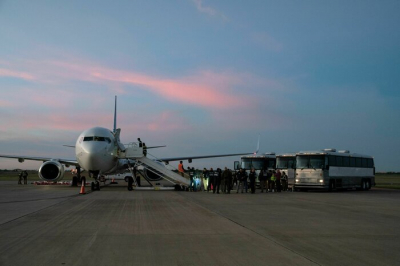
Controversy Swirls as Idaho's Largest Hospital Faces Surge in Emergency Flights for Abortion Care
Idaho Attorney General Raul Labrador has raised eyebrows with his skepticism regarding the motives behind the recent surge in emergency flights for pregnant patients out of state. Labrador expressed concerns, suggesting that hospital administrators might be leveraging these statistics for political gain rather than solely for medical necessity.
The backdrop of this debate unfolds against the backdrop of a crucial legal battle. The Supreme Court convened to deliberate on whether Idaho's stringent abortion ban extends to emergency situations. Since the implementation of this ban, St. Luke's Health System, Idaho's prominent healthcare institution, reported a substantial uptick in patients requiring emergency abortions outside the state's borders.
In 2023, a federal court intervened, temporarily halting Idaho's ban on emergency abortions. During this period, St. Luke's noted just one instance of transferring a patient out of state for such a procedure. However, following the Supreme Court's decision to lift the hold in January, the hospital witnessed a notable increase. Dr. Jim Souza, St. Luke's chief physician, revealed that within three months, they had airlifted six patients to neighboring states for emergency pregnancy terminations. Souza ominously projected a potential surge, estimating up to 20 patients needing out-of-state care in the current year alone.
The crux of the issue lies in Idaho's restrictive abortion laws, which permit terminations solely to safeguard the mother's life, neglecting considerations for her health. A federal court in 2022 criticized Idaho's narrow definition of a medical emergency, prompting a hold on this aspect of the law. However, the Supreme Court's recent decision to lift the hold has created ambiguity for healthcare providers.
Dr. Souza shed light on the dilemma faced by emergency physicians, who now grapple with uncertainty regarding when intervention is legally permissible. This uncertainty, he contends, has led to a cautious approach, resulting in unnecessary transfers and heightened risks for patients. The logistical challenges and medical risks associated with these emergency flights underscore the urgent need for clarity and compassion in reproductive healthcare policies.
Controversy Swirls as Idaho's Largest Hospital Faces Surge in Emergency Flights for Abortion Care
Idaho Attorney General Raul Labrador has raised eyebrows with his skepticism regarding the motives behind the recent surge in emergency flights for pregnant patients out of state. Labrador expressed concerns, suggesting that hospital administrators might be leveraging these statistics for political gain rather than solely for medical necessity.
The backdrop of this debate unfolds against the backdrop of a crucial legal battle. The Supreme Court convened to deliberate on whether Idaho's stringent abortion ban extends to emergency situations. Since the implementation of this ban, St. Luke's Health System, Idaho's prominent healthcare institution, reported a substantial uptick in patients requiring emergency abortions outside the state's borders.
In 2023, a federal court intervened, temporarily halting Idaho's ban on emergency abortions. During this period, St. Luke's noted just one instance of transferring a patient out of state for such a procedure. However, following the Supreme Court's decision to lift the hold in January, the hospital witnessed a notable increase. Dr. Jim Souza, St. Luke's chief physician, revealed that within three months, they had airlifted six patients to neighboring states for emergency pregnancy terminations. Souza ominously projected a potential surge, estimating up to 20 patients needing out-of-state care in the current year alone.
The crux of the issue lies in Idaho's restrictive abortion laws, which permit terminations solely to safeguard the mother's life, neglecting considerations for her health. A federal court in 2022 criticized Idaho's narrow definition of a medical emergency, prompting a hold on this aspect of the law. However, the Supreme Court's recent decision to lift the hold has created ambiguity for healthcare providers.
Dr. Souza shed light on the dilemma faced by emergency physicians, who now grapple with uncertainty regarding when intervention is legally permissible. This uncertainty, he contends, has led to a cautious approach, resulting in unnecessary transfers and heightened risks for patients. The logistical challenges and medical risks associated with these emergency flights underscore the urgent need for clarity and compassion in reproductive healthcare policies.
It seems like your message got cut off. If there's anything else you need, feel free to let me know!
In conclusion, the unfolding legal battle in Idaho encapsulates the profound complexities and ethical dilemmas inherent in reproductive healthcare policies. As stakeholders clash over the interpretation of laws and regulations, the fundamental rights and well-being of pregnant patients hang in the balance. The outcome of this dispute will not only shape the landscape of abortion access in Idaho but also reverberate across the nation, setting a precedent for the intersection of state and federal mandates in emergency medical care. Ultimately, the resolution of this contentious issue will have far-reaching implications for the protection of women's health and autonomy in critical moments of crisis.





